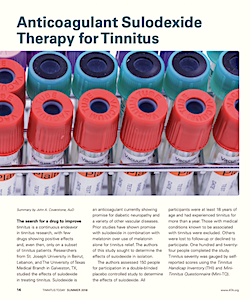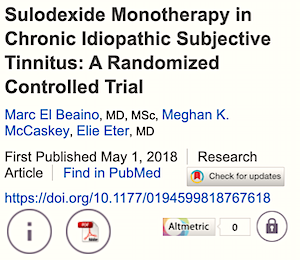
An important update on the development status of sulodexide, an anticoagulant drug that significantly reduced tinnitus severity scores in a phase 2 clinical trial in patients with chronic subjective tinnitus.
Background:
Sulodexide is a “highly purified mixture of glycosaminoglycans composed of low molecular weight heparin (80%) and dermatan sulfate (20%).”
It successfully completed a phase 2 study, “Randomized Double Blind Controlled Trial on Sulodexide Efficacy in Chronic Idiopathic Subjective Tinnitus”, and the results have already been published.
Quick summary:
- Sulodexide decreased tinnitus severity in patients with chronic subjective tinnitus. The results were statistically significant and sulodexide outperformed the placebo. It also reduced tinnitus regardless of whether someone started the treatment with severe tinnitus or mild tinnitus.
- The trial was randomized, double-blinded, and included a placebo group. The results demonstrated that people who received sulodexide experienced greater decreases in their tinnitus scores compared to people who only received a placebo.
- The treatment regimen involved taking 2 oral tablets each day (one in the morning, one in the evening) for 40 consecutive days. Half the group received the real sulodexide tablets and the other half received placebo tablets.

What happened AFTER the results were published…
These phase 2 results were first published a little over three years ago, on May 1, 2018, in a paper titled, “Sulodexide Monotherapy in Chronic Idiopathic Subjective Tinnitus: A Randomized Controlled Trial” and… the results were so impressive, the American Tinnitus Association wrote glowingly about sulodexide in that year’s Summer issue of Tinnitus Today, their flagship publication. From the article, “Anticoagulant Sulodexide Therapy for Tinnitus”:
After the 40-day administration of placebo or sulodexide, a significantly lower THI score was found in the group that had taken sulodexide, compared to those taking placebo (THI score of 30.1 and 40.5, respectively). Scores on the Mini-TQ also demonstrated a greater decrease for those taking sulodexide (average of 9.7 vs. 12.5). Further analysis showed that those taking sulodexide demonstrated decreased scores on the THI and Mini-TQ, regardless of their beginning score. The mechanisms by which sulodexide may improve tinnitus are not yet understood. However, this study demonstrated that this drug has potential to reduce the severity of tinnitus and holds promise for further study in this area.
Since then, sulodexide continues to be mentioned in a growing number of scientific papers. Most recently, the study of sulodexide was cited in a paper from April 16, 2021, titled, “Methodological Aspects of Randomized Controlled Trials for Tinnitus: A Systematic Review and How a Decision Support System Could Overcome Barriers”, published in the Journal of Clinical Medicine.
Another paper, also published within the last 12 months, titled “Auditory Neural Plasticity in Tinnitus Mechanisms and Management”, described how certain mechanisms behind sulodexide are connected to tinnitus:
There are also reports of drugs that can improve the microcirculation of the cochlea by improving the blood flow and thus increasing the clearance of ROS through the bloodstream […] and sulodexide has antithrombotic and anticoagulant activities, both of which have been shown to have positive effects in tinnitus patients […] mainly by improving the subjective perception and emotional response to tinnitus. However, the changes of inner ear microcirculation in tinnitus are not completely clear yet, and various antioxidants still need to pass through the blood-labyrinth barrier; thus, the therapeutic effect is not very precise.
Meanwhile, further recognition of its therapeutic potential (emphasis: potential) can be found in other credible sources, too. For example, in a 28-page clinical policy bulletin from health care giant, Aetna, on the topic of tinnitus treatments. Within that document, sulodexide — “a natural glycosaminoglycan with anti-thrombotic, profibrinolytic and vascular anti-inflammatory properties” — is categorized as an experimental and investigational tinnitus treatment option and the bulletin mentions how researchers believe sulodexide holds promise.
And yet…
Here is what is happening right now:
Sulodexide is currently “stuck” between phase 2 and phase 3 clinical trials.
And nothing has happened for the last three years. Its advancement toward a potential approval for use in chronic tinnitus has been frozen.
But unlike other promising treatments that seem to mysteriously “vanish”… and which receive a lot of attention and fanfare… only to “ghost” the tinnitus community without explanation…
The reason sulodexide “ghosted” actually has nothing to do with a clinical trial failure, retraction of results, some scary side effect that was later discovered, patent issues, lawsuits… nor does it have anything to do with some Big Pharma conspiracy to withhold a possible tinnitus treatment because it’s not profitable enough.
The reality of the situation is much more complex. But also simple to explain:
The geopolitical situation in the country where sulodexide was being studied and where the clinical trials took place (and conceivably, would have continued to take place) is not able to support its further advancement into phase 3 at this time.
I am going to respect the privacy of the individuals I contacted while investigating the situation here…
But that’s the situation.
To reiterate: there exists, at this very moment, a phase 3-worthy tinnitus treatment (a drug) that seems to hold great promise… and it is NOT moving forwarad — at all.
It is “stranded” in between phase 2 and phase 3.
It has been so for years. Nothing has happened, with respect to its advancement toward phase 3 and perhaps some day an approval, since the end of the last phase 2.
I know that might be sad to read for some people.
But the good news is, there is no “expiry date” and it can be unfrozen, unstuck, unpaused, and…
Unforgotten.
The only danger is for the community and research community to “forget” about sulodexide (or any other promising candidate, for that matter).
That appears to be what has happened. Consider this: big budget marketing campaigns and savvy PR departments exist to make sure you don’t forget about FX-322, Lenire, etc. But there is nobody actively working to make sure sulodexide receives your attention and driving its advancement and funding.
Whether that changes will ultimately be up to you — the community — and the organizations and people who are in a position that allows them to make the necessary arrangements required to give sulodexide (and the people who study it) a chance at continuing the next leg of this valuable work.
My hope is that this article can get the process started and put sulodexide back on the radar. (Side note: A few people on TinnitusTalk did notice, back in 2018. But that, sadly, was not enough. The thread, for whatever reason, did not grab the attention of the rest of the community at the time, and became inactive.)
The community — which means YOU — can decide whether it is worth discussing. Worth emailing organizations asking them for their position on this treatment. Talking about it on reddit, TinnitusTalk, Facebook, wherever else.
See what happens.
How to get updates on this situation:
Please remember to sign up for the TinnitusTreatmentReport.com email newsletter for ongoing updates about sulodexide and other promising tinnitus drug candidates.
References
https://journals.sagepub.com/doi/10.1177/0194599818767618
https://clinicaltrials.gov/ct2/show/NCT02737670
https://www.mdpi.com/2077-0383/10/8/1737
https://www.hindawi.com/journals/np/2020/7438461/
https://en.wikipedia.org/wiki/Sulodexide
https://www.tinnitustalk.com/threads/sulodexide-possibly-benefits-chronic-tinnitus.17918/